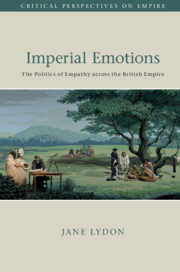‘Jane Lydon offers a scintillating and innovative analysis of the role of the emotions in binding together dispersed imperial communities, a connection critically reliant on who was excluded from the empathy at the heart of this endeavour. Attentive to a broad body of scholarship, Lydon's is a fresh and persuasive take on empire and on the history of emotions.'
Philippa Levine - University of Texas, Austin
‘This brilliant book will change the way you think about the history of the empire. In crystal-clear prose, Lydon reveals how emotion propelled the making of the British empire, while also offering a deeper understanding of how some of its worst legacies might be unravelled.'
Ann McGrath - Kathleen Fitzpatrick ARC Laureate Fellow, Australian National University
‘Emotion is a big category and, in Lydon’s hands, it’s a capacious hold-all as well. Though empathy gets a lot of attention at the front end of the book, the anger and fear arising out of the violence and precarity of white settlement cannot but take centre stage. Lydon teases out how and under what conditions ‘imperialist nostalgia’ serves as a container for the good, the bad and the ugly in all their many temporalities.’
Antoinette Burton
Source: Aboriginal History
‘In this dense and beautifully crafted monograph, Jane Lydon argues that emotion played a constitutive role in creating, as well as contesting, group identity and difference in the British Empire. Imperial Emotions takes a wide chronology, spanning the late eighteenth century to the present day, while the distinct case studies primarily focus on the circuits of communication between Australia, North America, New Zealand, and metropolitan Britain.’
Onni Gust
Source: Journal of British Studies
‘... the book that Lydon produces is both masterly and thoughtful. Rigorously researched and beautifully written, Imperial Emotions delivers a balanced historical appraisal of the benefits and limits of feeling for others.’
Sharon Crozier-De Rosa
Source: History Australia
‘… intriguing and engrossing … Imperial Emotions is a history of the compassionate emotions that also engages with and tells a range of other histories, including of imperial reading and visual cultures, anti-slavery discourses, humanitarianism, and masculinities … an important entry point into histories of the emotions across empire that I have no doubt will encourage further research in a range of new and different directions.’
Sarah Pinto
Source: Australian Historical Studies
‘The book is well-crafted around a series of relatively discrete though related case studies, which take us from the period of Australia’s colonisation to contemporary debates over republicanism.’
Alan Lester
Source: The American Historical Review
‘A valuable book … Most importantly, Lydon’s book mines a deep-seated political framing of colonial context as domestic realm, replete with figurations of family, parenthood and childishness that were made to serve the natural and cultural dominance of the metropole and of whiteness over Indigenous ways of life.’
Rob Boddice
Source: Journal of Colonialism and Colonial History
‘… the book will naturally be welcome; it is very serviceable, also, as an introduction to the high politics of the first three decades of the nineteenth century.’
Alex Middleton
Source: Chirst Church
‘Imperial Emotions offers trenchant examples of how the politics of empathy has unified new constituencies while excluding the most marginalized. The legacies of this history remain relevant to the ongoing project of recognition and reconciliation in Australia today.’
Ellen Boucher
Source: Journal of Modern History



